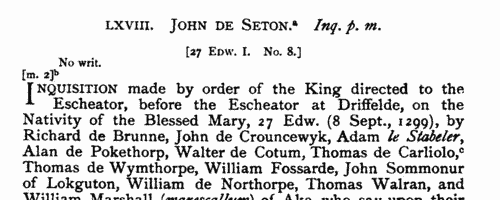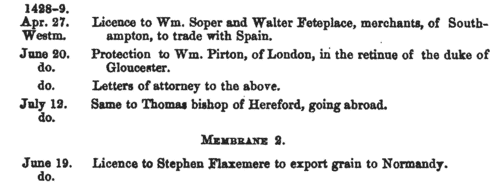Carethorpe Surname Ancestry ResultsOur indexes 1000-1999 include entries for the spelling 'carethorpe'. In the period you have requested, we have the following 3 records (displaying 1 to 3): Buy all | | | Get all 3 records to view, to save and print for £14.00 |
These sample scans are from the original record. You will get scans of the full pages or articles where the surname you searched for has been found. Your web browser may prevent the sample windows from opening; in this case please change your browser settings to allow pop-up windows from this site. Yorkshire Inquisitions
(1294-1303)
Inquisitions post mortem are inquiries as to the real estate and heir of each person holding in capite or in chief, i. e. directly, from the Crown, or whose estates had been escheated or were in ward. The age and relationship of the heir are usually recorded. Inquisitions ad quod damnum enquired as to any activities (including maladministration by local officials) that had resulted in any material loss to the Crown. Proofs of age are inquiries into the precise date of birth of an heir, usually involving local inhabitants recalling those circumstances which fixed that date in their mind. Yorkshire inquisitions for this period were edited by William Brown for the Yorkshire Archaeological Society, and printed in 1902. This index covers all names mentioned, including jurors, tenants, &c. The volume also includes two stray inquests, from 1245 and 1282.CARETHORPE. Cost: £4.00.  | Sample scan, click to enlarge

| The English in France
(1432)
King Henry VI of England (one of the grandsons of Charles VI of France) claimed the throne of France (and quartered the fleurs-de-lis of France with the lions of England on the royal standard) as had his predecessors since Edward III, as descendants of Philip IV of France. The English had real power or influence in Brittany, Normandy, Flanders and Gascony, and actual possession of several coastal garrisons, in particular Calais, where the French inhabitants had been replaced by English. Henry VI came to the throne only seven years after his father had trounced the French at Agincourt; but his cousin, Charles VII, who became king of France in the same year, spent his long reign rebutting the English king's claim to his throne by territorial reconquest and consolidation. The English administration kept a series of records called the French Rolls. On these are recorded royal appointments and commissions in France; letters of protection and safe-conduct to soldiers, merchants, diplomats and pilgrims travelling to France from England and returning, and to foreign legations. There are also licences to merchants to export to the Continent, and to captains to transport pilgrims. As Henry VI's reign progressed, and the English grip on northern France loosened, the French Rolls also increasingly include entries concerning the ransoming of English prisoners.CARETHORPE. Cost: £6.00.  | Sample scan, click to enlarge

| Somerset testators and legatees
(1501-1530)
Somerset was almost coextensive with the diocese of Bath and Wells, which exercised local probate jurisdiction through its consistory and archdeaconry courts: but superior to the diocese was the province of Canterbury. Somerset testators who also had property outside the county had their wills proved in the Prerogative Court of Canterbury (PCC). The Somerset Record Society embarked on a program of publishing genealogical abstracts of the registered copy wills of Somerset testators in the PCC archives, and in 1903 (volume xvi) printed abstracts edited by the Reverend F. W. Weaver from the PCC registers 1501-1503 (register Blamyr), 1504-1506 (Holgrave), 1506-1508 (Adeane), 1508-1511 (Bennett), 1511-1514 (Fetiplace), 1514-1517 (Holder), 1517-1520 (Ayloffe), 1520-1522 (Maynwaryng), 1523-1525 (Bodfelde), 1525-1528 (Porch) and 1529-1530 (Jankyn). In addition, the volume includes abstracts of 48 Somerset copy wills in the registers of the Archbishops of Canterbury at Lambeth Palace Library from 1363 to 1491. The heading of each abstract gives the year of making the will (not the year of probate) and the testator's name in bold. Below that is the quire number and name of the PCC register. Date and details of probate are given at the foot of each abstract. Spellings of surnames are preserved as they appear in the registered copy wills, and may vary within a single document.CARETHORPE. Cost: £4.00.  | Sample scan, click to enlarge

|
Research your ancestry, family history, genealogy and one-name study by direct access to original records and archives indexed by surname.
|





